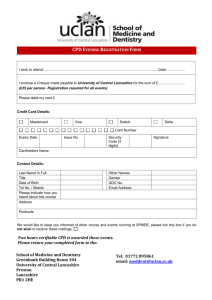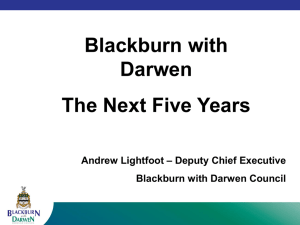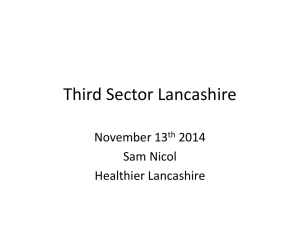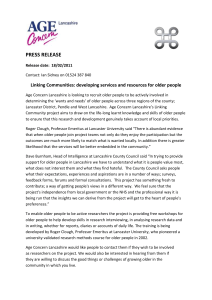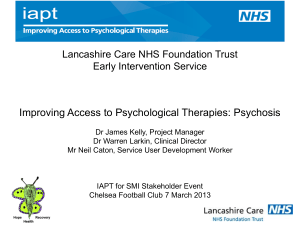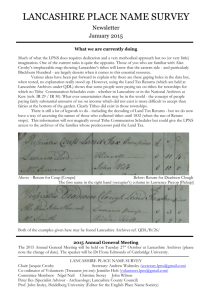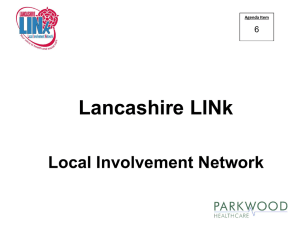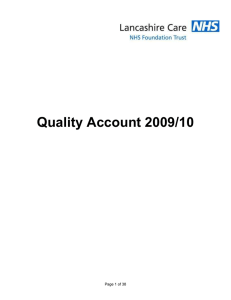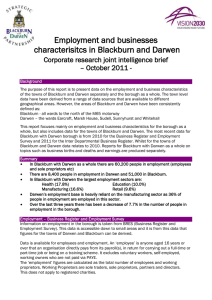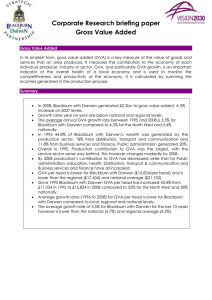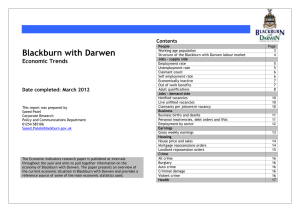camhs elcas - elht further information
advertisement
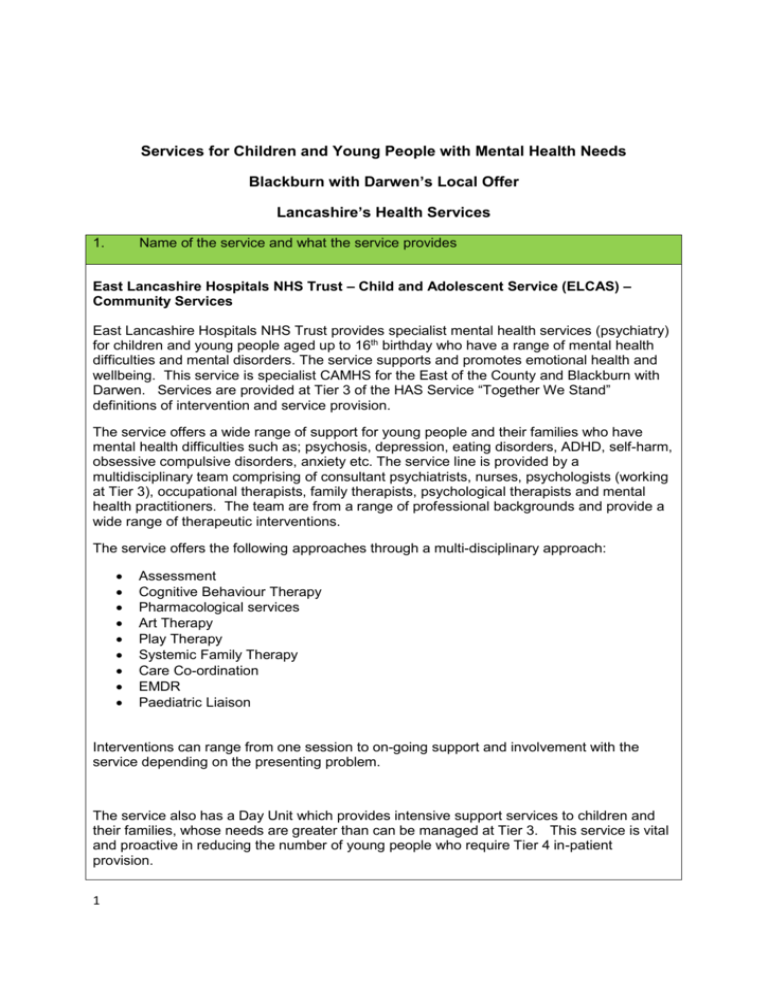
Services for Children and Young People with Mental Health Needs Blackburn with Darwen’s Local Offer Lancashire’s Health Services 1. Name of the service and what the service provides East Lancashire Hospitals NHS Trust – Child and Adolescent Service (ELCAS) – Community Services East Lancashire Hospitals NHS Trust provides specialist mental health services (psychiatry) for children and young people aged up to 16th birthday who have a range of mental health difficulties and mental disorders. The service supports and promotes emotional health and wellbeing. This service is specialist CAMHS for the East of the County and Blackburn with Darwen. Services are provided at Tier 3 of the HAS Service “Together We Stand” definitions of intervention and service provision. The service offers a wide range of support for young people and their families who have mental health difficulties such as; psychosis, depression, eating disorders, ADHD, self-harm, obsessive compulsive disorders, anxiety etc. The service line is provided by a multidisciplinary team comprising of consultant psychiatrists, nurses, psychologists (working at Tier 3), occupational therapists, family therapists, psychological therapists and mental health practitioners. The team are from a range of professional backgrounds and provide a wide range of therapeutic interventions. The service offers the following approaches through a multi-disciplinary approach: Assessment Cognitive Behaviour Therapy Pharmacological services Art Therapy Play Therapy Systemic Family Therapy Care Co-ordination EMDR Paediatric Liaison Interventions can range from one session to on-going support and involvement with the service depending on the presenting problem. The service also has a Day Unit which provides intensive support services to children and their families, whose needs are greater than can be managed at Tier 3. This service is vital and proactive in reducing the number of young people who require Tier 4 in-patient provision. 1 The service does not provide Tier 2 uni-disciplinary services, Clinical Child Psychology Services or CAMHS Learning Disability Services. These are provided by colleagues in Lancashire Care Foundation NHS Trust 2. Address and contact details and area covered The Trust service website can be found at: www.elht.nhs.uk The service is based at Burnley General Hospital and contact details are: East Lancashire Child and Adolescent Service, Area 3, Level 3, Burnley General Hospital, Casterton Avenue, Burnley, BB10 2PQ. Telephone: 01282 804806 (reception) The service is available 9.00 am to 5.00pm Monday to Friday with some extended working hours for clinics. The admin telephones are answered within office hours. Outside working hours, if there is an emergency families are directed to contact Social Care Duty Team, A&E or GP as appropriate. 3. The service is for This service is designed to serve children and young people up to 16th birthday who have a range of mental health difficulties or mental health problems, usually requiring a range of interventions from a variety of professionals. In line with the commissioning arrangements, the child or young person should be 15 years or younger, be resident in East Lancashire or Blackburn with Darwen and be registered with a Lancashire or Blackburn with Darwen GP. The child or young person can be referred into the service if they are experiencing mental health difficulties such as, but not exclusively: Psychosis Depression Eating Disorders ADHD Self-harm Obsessive compulsive disorders Anxiety Post-Traumatic Stress Disorder The team will refer the child or young person to other appropriate services if they are unable to provide certain interventions. 4. Accessing the Service The service can be accessed by a process of referral. ELCAS currently receive referrals 2 from a wide range of people including GPs, children’s social care, paediatricians, other CAMHS teams, school teachers and school nurses. The service does not accept selfreferrals. Referrals other than from health need to be via an open and active CAF to ensure that early intervention and prevention has been addressed before referral into a specialist psychiatry service. The team is divided into geographical areas covering: Burnley & Pendle Hyndburn, Rossendale & Ribble Valley (Ribblesdale) Blackburn with Darwen The teams can be contacted directly to gain advice, support or signposting. Please ring the reception number who will be able to redirect your call to the most appropriate Team Coordinator. The service can be accessed free of charge and waiting lists for initial assessments are currently averaging below 6 weeks. The outcome measures used in the Service are the SDQ’s (Strengths and Difficulties), CGAS (Child Global Assessment Scale), HONOSCA (Health of the National Outcome Scales for Adolescents). We also obtain patient feedback in line with the Commission for Health Improvement 5. Decision making processes used to determine who is eligible to receive a service. The child or young person will be eligible to receive the service if they are aged 15 or below, resident in East Lancashire or Blackburn with Darwen and are registered with an East Lancashire or Blackburn with Darwen GP. They should be experiencing mental health difficulties where previous lower level interventions have been implemented. The multi-disciplinary team will assess the referral to decide whether the service is appropriate. If the team require more information they will try to contact the referrer and/or the family, and possibly school once the permission of the family is obtained. Once agreement is reached to offer an appointment, families are requested to call the service and chose an assessment slot which is suitable to them. Following assessments, the team meet and discuss the assessments to decide what treatment options are available. Letters are written to the referrer and young person or family after assessments to outline the decisions and plans. 6. Methods of communication with service users/patients and how they are involved in decision making/planning. 3 The service encourages Children and Young People and their families to voice their views about the service either directly to the practitioner involved in delivering their care, contacting a service manager or through East Lancashire Hospitals PALS and as a final resort the complaints procedure. Other methods of communication include: suggestion box in the waiting room Trust website Service user information leaflets Young people friendly materials and magazines in all waiting rooms. Phone calls and meetings with families CHI feedback forms The service adopts a collaborative care planning approach. This approach allows the young person and their family/carers to be actively participating in their treatment and care. The use of bilingual interpreters as appropriate for families whose first language is not English can be arranged. Parents or carers are usually present at appointments and will be informed of how their child is doing. 7. Service Accessibility. Services are provided in a variety of settings, both within the hospital sites and community. This involves use of schools, health centres, children’s centres and young people’s homes as well as a number of different venues that young people may request. All the health and local authority provision are wheelchair accessible and have disabled toilet facilities. The service has an out of hours telephone advice provision for young people who present to A&E or the children’s ward. The commissioned out of hours pathway for all other concerns out of hours is via the Local Authority Emergency Duty teams. In case of emergency the family would be directed to contact Social Care Duty Team, A&E or GP as appropriate. For young people who present to A&E following an exacerbation in mental health symptoms, the pathway is for admission to the Children’s ward and for an appropriate assessment to take place. This assessment is usually by the ELCAS team the next working day. 8. Workforce Skills and Training All staff are compliant with mandatory training requirements and have completed a personal 4 development review with training needs identified. A training needs analysis is completed both at individual level as part of PDRs and at a team level. 9. Contacts for further information The first point of contact for the parent/carer or child/young person to discuss something about their care would be to the practitioner involved in delivering their care. If the service user has any urgent worries or urgent concerns, they are able to call the Team co-ordinator for their geographical team who will be able to assist. Please contact reception on 01282 804806 who will redirect the call to the most appropriate person. Once referred, the appropriate team will consider whether the child or young person will benefit from the service. The referrer will also be able to contact the service in advance to discuss whether the child or young would benefit from service support. ELCAS forms a small component of a wider network of CAMHS. CAMHS in its broadest sense covers a wide range emotional health and well-being as well as specialist psychiatry. Primary Health Care, including Health Visitors, School Nurses and GPs, schools and other support services provide an essential early intervention and early support service and these should be used and accessed before referral to ELCAS as a stepped approach to intervention. 10. Feedback Queries, compliments and complaints can be discussed with a member of staff or team manager. If families wish to make a formal complaint we advise that the Trust process is followed and we can assist with that process if required. Most issues can be sorted out swiftly and effectively through open and honest communication. Incidents and complaints received are investigated thoroughly and lessons learned are shared with the service through the Trust governance structures. 5
